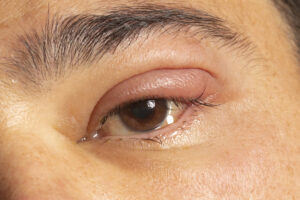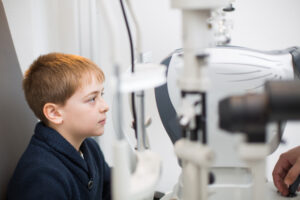High-Quality Anti-Fatigue Lenses for Ultimate Eye Comfort
These days, many people sit in front of a computer screen for four hours or more. Others spend many hours reading books with small lettering. These activities can put a significant strain on the ocular muscles, since they require us to alter our focus from far away to up close, and then sustain that focus for an extended period of time.
Thankfully, anti-fatigue lenses exist! These lenses are specifically designed to prevent symptoms of visual weariness, or tired eye muscles, by helping to relax the muscles of the eyes.
What are anti-fatigue lenses?
Anti-fatigue lenses have a progressive shift in prescription built in, with assistance for near vision towards the bottom of the lens. It’s important to note that these are not the same as progressive or bifocal lenses; anti-fatigue lenses have only a small reading prescription at the bottom, and do not have a corridor of prescription transition the way that progressive lenses do. They also do not have a hard line for the reading prescription the way that bifocal lenses do.
Anti-fatigue lenses have a section at the top that helps with distance vision, which is vital for activities such as walking and driving. As you descend down the lens, it gradually merges into the prescription best suited for near vision.
By giving your eye muscles a break with an anti-fatigue lens, you may be able to delay refractive problems that are normally associated with aging, and are caused by weakness of the eye muscles. Sometimes, anti-fatigue lenses are used as a transition into progressive lenses. This is a great option for people who are unsure about their readiness to use progressive lenses. Wondering if an anti-faitgue lens may be right for you? Book an eye exam for a consultation.
Do anti-fatigue lenses really work?
Since these lenses relax the eyes for close distances, if you suffer from eye strain from staring at a computer screen for too long, you will get your money’s worth out of these.
For some people, wearing an anti-fatigue lens can slow the onset of presbyopia (age-related inability to see up-close). Moreover, it alleviates digital eye strain, which is associated with a higher risk of muscle deterioration. Additionally, they require little adjustment time compared to progressives.
If you’re thinking of using an anti-fatigue lens, you’ll need a frame to put it in. Have a look at our eclectic frame selection!








